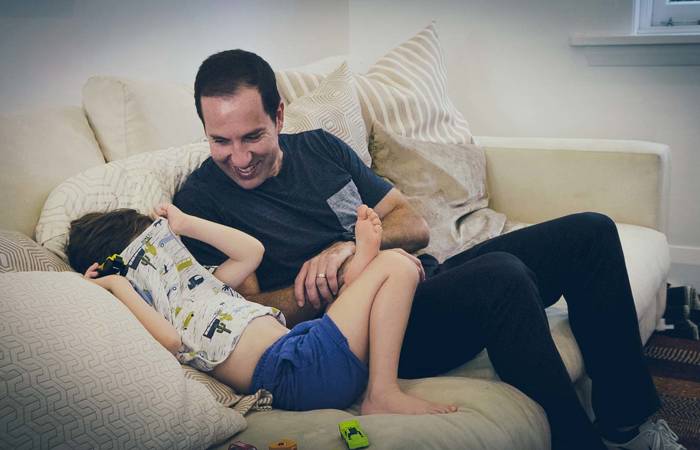Like what you see?
Sign up to receive more free parenting advice.
Thank you for subscribing to our newsletter!
Child Development

Credit: iStock.com/manonallard
Growing up with a sibling who has special needs is a reality in many Australian homes.
Being raised with a brother or sister with significant disabilities can bring benefits including opportunities to learn resilience and empathy at a very young age.
Children who have a sibling with a disability may be more sensitive or responsive to other’s needs, having been exposed to the need for tolerance and compassion.
However, it also carries challenges for both the children and the parents including the potential for children to feel neglected in favour of their siblings with special needs.
Clinical psychologist and author of The Bonsai Child, Judith Locke says parents of special needs children are often stressed and time poor.
“Stress is a big factor but also the parents may be facing feelings of guilt, dealing with the reaction of others to their child’s disability and the stress of extra commitments such as medical appointments. Having a special needs child means the stakes immediately become much higher,” Dr Locke says.
“In my experience, the way parents cope has more to do with how they present the challenges to the family as a whole – not presenting themselves as time poor and stressed or not coping. They need to look at things in a matter of fact way (even if it is just an appearance for the children), so that nobody feels a burden on anyone – either the child with the disability or the child without the disability.”
Maintaining a positive attitude
Dr Locke believes it’s important parents have a positive attitude because that will encourage the children’s attitude. But, it’s not possible to be positive at all times.
Dr Locke says it’s difficult to be in a situation where you feel stressed and parents will need to be able to air their troubles from time to time.
“If you do need to complain or to get help, complain to someone who can actually help you - not someone who might just feel guilty; such as your child. It’s also important for parents not to constantly apologise to the sibling of the special needs child.”
What can parents do if they struggle with feelings of guilt because they’re devoting more time and attention to their special needs child and worrying their other child is missing out?
Dr Locke believes there are several ways parents can find ways to make things better for the child, such as being more indulgent of their behaviour, spending time with them or giving them some extra treats occasionally.
“There will be times the parent will feel they have to apologise, ‘I’m sorry we can’t get your shoes today as your sister’s appointment went overtime.’ That kind of apology is fine, but if there’s a constant apology for a parent’s resources being pulled in the other direction, it’s very easy for the sibling to get a victim mentality, which will impact their chances of developing emotional issues.
“There can be a situation in some families where one child is so badly behaved and nobody is allowed to say anything. But I think sometimes it's fine for a child to say to a parent, ‘Why does it always have to be about our sister/brother?' Sometimes kids are a good, frank observer of what's going on.
“Always make sure you don’t say to your child, ‘Oh look at your poor sister!’ You’ve got to affirm their dignity, that’s very important.”
Understanding what 'special needs' means
Of all Australians with a disability in 2009, 290,000 (7.2%) were children aged 0-14 years1. The severity of a child’s disability can range from those without a specific limitation or restriction, to those with only a schooling limitation or restriction, to those with core-activity limitations ranging from profound/severe to moderate/mild.
Of all children with a disability, over half (57%) had a profound or severe disability and one fifth (18%) had a moderate or mild disability.
When it comes time to explain to your child why their brother or sister is different and help them understand what ‘special needs’ means, Dr Locke stresses the importance of parents using age appropriate language.
This simply means you need to adjust your explanation to what you believe your child is ready to hear.
“Be as truthful as you can within reason. You don’t want them to find out the truth from someone else. But, if their sibling’s issue is life threatening, maybe they are too young to hear that yet. Be prepared to answer all of their questions, but it’s okay to say you don’t know something,” Dr Locke says.
“Make sure you show a level of calm in this; children can cope with a lot but what they can’t cope with is when they see their parents highly emotional or looking like things are beyond their ability to face things. That will make children feel unsafe, or feel like they have to comfort the parent, and that is too large a task for them.”
Everyone is doing the best they can
Inevitably there will be times where the sibling of the special needs child has ‘had enough’ or feels left out, or might feel they want to want to make themselves heard.
It’s not difficult to understand why, if the special needs child gets a lot of attention, that the other child may feel resentful that they’re not getting equal attention from their parents.
Dr Locke says there is nothing wrong with a child venting every now and then.
“We think that venting is good for people as they feel heard, but allowing them to do it is encouraging a victim mentality which is going to do them more of a disservice in the long term.
“Above all, it’s important to remind yourself that everyone is doing the best job they can, so parents shouldn’t feel overly guilty about anything. Focus on the next day, fresh, with the best intentions and not be dwelling on the fact you didn’t do what you had planned.
“Life with a special needs child is hard enough without adding constant guilt to the scenario as well.”
Dr Locke also advises parents to step back and check that they’re managing the family in a manner that’s equally caring and demanding of age appropriate behaviours.
“Always seek professional advice and don’t play amateur psychologist – also make sure that the sibling doesn’t go to the psychologist with you as it’s best for parents to work out the strategies of managing the family.
“Adults are better able to coach children and so they are best to see the psychologist for strategies rather than kids.”
[1] Source: ABS 2009 Survey of Disability, Ageing and Carers
Case study
Michelle is the mother of six year old Amy and five year old Liam, who has ADHD
Liam was diagnosed with ADHD when he was almost five. I remember when he was two, I thought he was going through the terrible twos. He was very hyperactive and quite violent. But by four he was really out of control, hitting and smacking Amy.
It became quite tough for her. I asked friends with sons, ‘Are all boys like this?’ There were never any ‘down times’ with Liam, he was always on the go, very loud, didn’t stop talking, couldn’t let other people talk, he’d just talk right over them. He often struck out at our cat, hitting him with a stick.
The last straw was at a park when he was hitting the kids waiting to use the swing. My friend said, ‘I think you need to see a doctor, he seems very ADHD.’ She knew what she was talking about as her nephew was ADHD.
Anyway, we saw a psychologist. He’s now on medication and life is a lot easier but it’s still not easy and it’s taken a toll on Amy. She’s now old enough to tell me that she finds it very hard being his sister and that all our attention is on him. I feel very guilty at times that Amy doesn’t get the attention she deserves.
My husband and I have worked out a way to make things work. On weekends, he’ll take Liam out while Amy and I have a special day together. And the following weekend, she’ll have a special day with her father. I felt it was important to separate her from Liam, to give her a break. It’s also a great way for her to have a bonding day with either her mum or dad and to make her feel special.
We really spoil her on the weekends and make sure that she gets heard. My advice to parents is to make sure you spend your time equally with both children. And keep the conversation going – I’m always asking Amy how she’s feeling. I don’t want her to look back on her childhood thinking that it was ‘all about Liam.’
Stay up to date with the latest news and articles from First Five Years
Thank you for subscribing to our newsletter!






